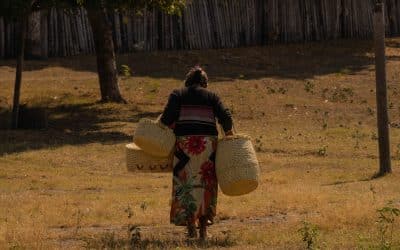par Rachel Smolker, Biofuelwatch, États-Unis
Lire le rapport complet : Swallowing Indonesia’s Forests
Le gouvernement indonésien a récemment annoncé ses plans de projets « Food Estate» dans les provinces du Kalimantan central, de Papouasie et de Sumatra du Nord. Ces projets cibleraient des centaines de milliers d’hectares de terres, y compris les dernières aires de forêts tropicales vierges de la région, à des fins de d’exploitation et de transformation.
Continuer à lire en anglais…
Past experience with food estate projects (the “Mega Rice” project and the “Merauke Integrated Food and Energy Estate”) proved to be a social and environmental disaster, displacing communities, producing little food and resulting in more rather than less hunger, and leaving vast swathes of previously forested land denuded and smoldering with peat fires that polluted air across continents.
Who benefitted? Those who profited from the sale of timber followed by the establishment of palm oil and other export commodity crops. The new food estate proposals are framed as a response to the economic impacts of COVID-19 and food insecurity, but in reality they are opportunistic land grabs aimed to further pad the bloated coffers of a few corrupt individuals at the expense of people and the planet.
With the implementation of the food estates partially under the authority of the ministry of defense, the displacement of communities and threats of violence are commonplace, and resistance often life-threatening. Indonesia’s people deserve to be safe, to enjoy food sovereignty, to be consulted about their lands, and treated with respect. The governments’ proposed food estate programs will do none of the above.
Our planet is in crisis. Deforestation and ecosystem degradation, pollution and loss of biodiversity, and the impoverishment of peoples and places leaves us faced with dire predictions for the future. Meanwhile, international agreements including the Sustainable Development Goals, the Aichi targets, the UN Declaration on the Rights of Indigenous Peoples, and international agreements on climate and biodiversity, all will be rendered meaningless and blatantly violated if Indonesia proceeds with stated plans for more “food estate” disasters. The international community cannot abide by these proposals. Banks and potential investors must act responsibly to reject Indonesia’s thinly veiled plans for escalated destruction of her forests and her peoples.




